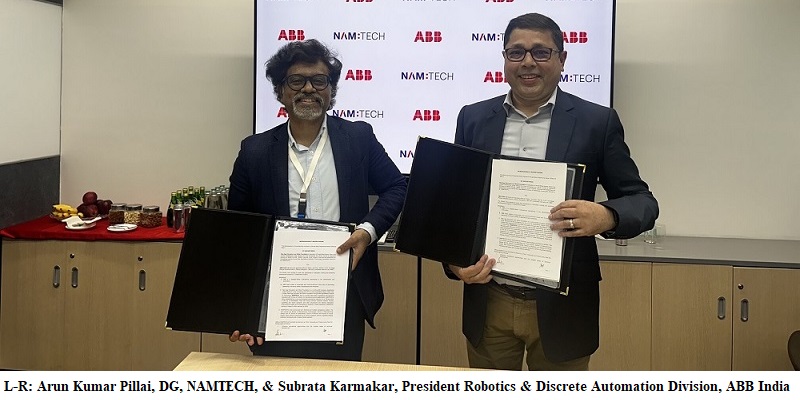Schedule a Call Back
51% of Indian manufacturers plans to adopt smart manufacturing by the next year
 Interviews
Interviews- Apr 27,23

What are the key takeaways for Indian manufacturers from the “State of Smart Manufacturing Report”?
The report has been very positive about Indian manufacturers, who are better than their global counterparts in investing in technology. Process automation (33 per cent), cloud/software as a service (SaaS) (30 per cent), industrial internet of things (IIoT)/internet of things (IoT) (25 per cent), machine integration (24 per cent), and machine learning/artificial intelligence (23 per cent) are the technologies where the major return of investment has been seen. More than half of Indian manufacturers use Smart Manufacturing as it continues to grow as an important catalyst for digital transformation. Indian manufacturers recognise the need to adopt advanced technologies such as the Industrial Internet of Things (IIoT), artificial intelligence (AI), and machine learning (ML) to stay ahead of the competition.
The report highlights the importance of data analytics in smart manufacturing. This involves breaking down silos, encouraging cross-functional collaboration, and investing in employee training and development to ensure they have the skills to work with these new technologies. Indian manufacturers must have the ability to collect, process, and analyse vast amounts of data generated by connected machines, devices, and sensors to derive actionable insights that can drive better decision-making.
The report shows that Indian manufacturers who have implemented smart manufacturing technologies are already seeing significant benefits, including improved productivity, increased efficiency, and reduced downtime.
It also highlights the growing significance of environmental, social and governance (ESG) for manufacturers - 87 per cent of Indian respondents have at least some formal ESG or sustainability policy in place. In addition, the report advocates for collaboration between government and industry in creating the manufacturing workforce of the future. As such, Indian manufacturers need to embrace these technologies to remain competitive in the global market.
How SMEs/MSMEs are utilising smart manufacturing to leverage their operations in India?
Smart manufacturing technologies help SMEs/MSMEs to streamline their production processes, eliminate bottlenecks, and improve overall efficiency. With the help of IoT-enabled sensors and devices, SMEs/MSMEs can monitor their production lines in real-time, identify issues, and take corrective measures proactively. Smart manufacturing technologies such as automation and robotics can help them to reduce their labour costs, minimise material wastage, and optimise their supply chain. This leads to cost savings and helps them to remain competitive in the market.
AI-powered quality control systems can detect defects in real-time and trigger alerts for corrective actions. It is easier to respond quickly to customer demands and provide customised products leveraging these technologies. The use of big data analytics can help SMEs/MSMEs to understand customer preferences and offer personalised products and services. Smart manufacturing technologies can help them to improve safety in the workplace. Robotics and automation can reduce the risk of accidents, and IoT-enabled sensors can detect hazardous situations in real time.
What is the level of adoption of smart manufacturing in India? Does the study conducted give any insights?
The report highlights that many Indian manufacturers are exploring and investing in smart manufacturing technologies to increase their operational efficiency, reduce costs, and improve their overall competitiveness. The level of adoption may vary widely depending on the industry, company size, and other factors. 51 per cent plan to adopt smart manufacturing within the next year, while 57 per cent of companies already use smart manufacturing solutions. When it comes to talent and the workforce, 58 per cent of survey respondents in India shared that employee resistance to technology adoption and change is the main barrier to adopting smart manufacturing followed by the lack of knowledge and skills to take advantage of smart manufacturing technology and benefits. The report includes recommendations and adoption guidelines for manufacturers on system-level approaches to reduce ‘time to talent’ and achieve Industry 4.0 business outcomes too.
Supply chain disruptions, along with high-level market uncertainty, are one of the major problems faced by manufacturers today. How smart manufacturing can help mitigate this challenge?
Smart manufacturing technologies can be used to monitor the health and performance of equipment and machinery in real time. This enables manufacturers to identify potential issues before they cause disruption and take corrective action to prevent downtime. These systems can provide real-time visibility into inventory levels and locations, which can help manufacturers optimise their supply chain and reduce the risk of stock outs or excess inventory.
By leveraging AI and ML algorithms, smart manufacturing systems can analyse historical sales data and other factors to forecast demand more accurately. This can help manufacturers plan production schedules effectively and avoid overproduction or underproduction. Smart manufacturing systems can be designed to be highly flexible and adaptable to changing market conditions. This can help manufacturers quickly adjust their production processes to meet changing demand or supply chain disruptions.
Industrial Internet of Things (IIoT), machine integration, machine learning, and artificial intelligence are some trending technologies. What technological adoptions companies are looking forward to and find most reliable?
Many companies are adopting predictive maintenance solutions that use IIoT, machine learning, and AI to monitor equipment and predict when maintenance is required. This helps them reduce downtime, improve asset reliability, and save costs. Companies are investing in autonomous machines that can operate with little or no human intervention. These machines use IIoT, machine learning, and AI to make real-time decisions, optimise performance, and reduce errors.
Companies are using digital twins to monitor performance, test new designs, and optimise processes. Augmented reality (AR) is being used to enhance training, maintenance, and troubleshooting processes. Companies are using AR to provide remote support, reduce training time, and improve worker safety. Cloud computing is being used to store and analyse vast amounts of data generated by IIoT devices and to gain real-time insights, reduce costs, and increase efficiency.
With the inclusion of smart manufacturing, reskilling, and upskilling of the workforce have become a need for companies globally. What steps organisations are taking in this lead?
Reskilling and upskilling the workforce is a critical step in the adoption of smart manufacturing technologies. Companies are recognising the need to reskill and upskill their workforce to ensure that they have the skills and knowledge needed to succeed in this new environment. By investing in training and development programs, companies can ensure that their employees have the skills needed to succeed in this new and evolving environment.
Many companies are investing in training and development programs that focus on expanding the skills needed for smart manufacturing. Some companies are partnering with educational institutions to develop training programs and curricula that align with the skills needed for smart manufacturing. These partnerships may include internships, apprenticeships, and other work-based learning opportunities. Companies are conducting skills assessments to identify skills gaps in their workforce. This helps them understand the areas where training and development are needed. Some companies are implementing reskilling programs that provide employees with the training and support needed to transition to new roles within the company.
Sustainability is a buzzword today. What is the take of the companies on sustainable developments, according to the report?
Sustainability has become a key focus area for companies today, as they recognise the importance of environmental, social, and governance (ESG) issues in their operations and their impact on society and the planet. Companies are increasingly taking a proactive approach to sustainable development and are setting measurable sustainability goals and targets to reduce their environmental impact and improve their social responsibility. These goals can include reducing greenhouse gas emissions, increasing the use of renewable energy, reducing waste, and promoting diversity and inclusion. At the same time, they are investing in sustainable technologies such as renewable energy, energy-efficient buildings and transportation, and circular economy models. Smart technologies can help reduce their environmental impact and create more efficient and sustainable operations.
It is encouraging to note that companies are also engaging with stakeholders such as customers, suppliers, employees, and local communities to understand their sustainability concerns and incorporate them into their operations. This can help build trust and support for sustainable development initiatives. Larger corporates are reporting on their sustainability performance to stakeholders through sustainability reports, ESG ratings, and other disclosures. This helps increase transparency and accountability and demonstrates a commitment to sustainable development.
It is heartening to note that the report highlights the growing significance of ESG for manufacturers - 87 per cent of Indian respondents have at least some formal ESG or sustainability policy in place. In addition, the report advocates for collaboration between government and industry in creating the manufacturing workforce of the future.
Related Stories

ABB Robotics and NAMTECH join hands to set up School of Robotics in India
School of Robotics will open in 2025, advancing robotics education and industry integration in India. ABB Robotics will bring robotics expertise and mobilise global ecosystem of innovation partners ..
Read more
Five ways advanced robots are solving construction industry challenges
From cobots to computer vision, robotics professionals and construction managers have forged a lifelong bond. Advanced construction robotics are the single best contributor to industrial progress in..
Read more
Altem Technologies appoints Shamsundar Naik as new Vice President of sales
In his previous roles besides several strong engagements in the manufacturing and engineering services sector, Shamsundar has also significantly influenced the academic sector, championing the shift..
Read more











